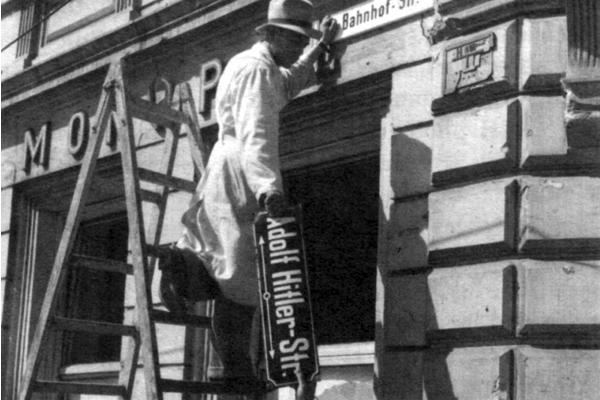A Brief Note to the History Graduates of 2020

Denazification of street names begins, Trier, 1945
I congratulate you all on graduating with a major in History. I think and hope that the skills you have developed here in finding and assessing evidence to write truthfully about the past will be of particular importance as we seek to work our way out of the current catastrophe. You are among the graduates of spring 2020 most able to reflect on the connection between examination of catastrophe and the path to a better future.
Those of us who work on modern German history have written a great deal about how reflection on catastrophe was indispensable to bringing about a better future. On May 8, 1945 when the Nazi regime unconditionally surrendered to the Allied armed forces, Germany was synonymous with mass murder, antisemitism, racism, aggression, lies and conspiracy theories. In May 2020, Angela Merkel, the Chancellor of the German Federal Republic, could tell the German public in calm tones about the scientific and medical reasons shaping the government’s national policy of testing, contact tracing, isolation and stay-at-home orders. She could speak of the need for unity and finds a citizenry that on the whole is willing to believe that the government is telling them the truth. The result is that there were about 8,100 deaths due to COVID-19 which, adjusted for population in the United States would mean about 24,000 deaths in this country compared to the more than 100,000 we now know of. The German economy is slowly opening up, and will do so sooner and more safely than ours.
Many decades of telling the truth about the Nazi past went into Germany’s comparative success in fighting COVID-19 compared to our country. After Nazism, a minority, including some historians, sought to tell the truth about the crimes and lies of the Nazi regime. That minority faced a broader public much of which wanted to change the subject to its own troubles, or to remain silent about what the Nazis and their many supporters in Germany had done to others. These historians and intellectuals argued that if a better Germany was going to emerge after Nazism and the Holocaust, it would have to face the truth about those events, and how and why they took place. The bitter experience of overwhelming defeat, massive loss of life and allied occupation, combined with reemerging traditions of liberal democracy and respect for human rights, aided this truth seeking intellectual and scholarly elite as it sought to write the truth about the past and to bring at least some of the guilty to justice.
In postwar Germany, there was a connection between reflection on catastrophe, on the one hand, and understanding of how to create a decent future. If a more fair, decent American society and economy, and yes, a viable liberal democracy is to emerge from our current catastrophe, then we also need to connect reflection on the causes of catastrophe to insights that point to a better future.
The discipline of history has a central role to play in that effort. We will have great need of a young generation of historians or people such as yourselves who have learned the traditions of our profession. You should take great pride in having graduated with a major in history. I hope you will choose to place skills you have learned here in service of defending and developing the search for truth that we need to move from catastrophe to recovery.